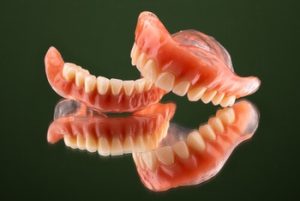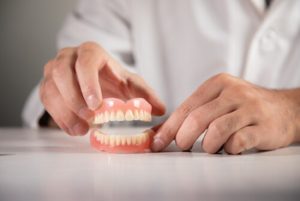Tooth loss does more than affect your smile; it can change the way you eat, speak, and feel in everyday situations. Whether you are missing one tooth or all the teeth in your mouth, a thoughtful solution can restore more than just function. Modern dentures are not like those of the past. They are shaped with precision, built using updated materials, and designed to work naturally with your facial structure.
Finding the right fit depends on your individual needs, preferences, and oral health. There are several approaches available, and each comes with its own advantages and limitations. This guide will explore the different types of dentures and cost considerations involved, offering a comprehensive yet approachable look at what to expect from the first consultation to long-term comfort.
Choosing the Right Type: What Are Your Options?
 Complete Dentures for Total Tooth Replacement
Complete Dentures for Total Tooth Replacement
Complete dentures are used when all teeth in either the upper or lower jaw are missing. These are designed to rest securely on the gums and restore chewing function and overall facial structure. Full dentures can be removed daily and are often made from acrylic resin. The fitting process is highly personalised to ensure maximum comfort. These are one of the most widely used options in full-arch restoration. The starting cost for complete dentures typically begins at around $1,500 per arch.
Partial Dentures for Preserving Remaining Teeth
Partial dentures are ideal when some natural teeth remain. They fill the gaps left by missing teeth and help maintain alignment. The design connects to surrounding teeth and can be crafted in materials like chrome or flexible nylon. These appliances offer stability while protecting the bite from further deterioration. Retaining remaining natural teeth is key to their effectiveness. The starting cost for partial dentures generally begins at approximately $1,000.
Implant Supported Dentures for Added Security
Implant supported dentures are secured by dental implants surgically placed into the jawbone. This method offers better stability, natural biting function, and added bone health support. They are a popular fixed option among those seeking to replace multiple missing teeth. Unlike removable dentures, these feel more permanent and remove the worry of shifting during meals or conversations. The starting cost for implant supported dentures usually begins at about $4,000.
Flexible Dentures for Soft Tissue Comfort
Flexible dentures are made from pliable materials that mould more naturally to the shape of your gums. These are often used when patients experience irritation with rigid baseplates. Flexible partial dentures are discreet, translucent, and tend to feel more secure. They’re an excellent choice for those sensitive to conventional materials. These are particularly helpful in smaller tooth replacement areas. The starting cost for flexible dentures typically begins at $900.
Immediate Dentures for Same-Day Smiles
Immediate dentures are prepared before scheduled tooth extractions and placed immediately afterwards. These prevent the experience of walking away from the clinic without teeth. Though temporary, they allow healing to begin without compromising daily function. Adjustments are typically required as gum tissue heals. These are often the first step in a long-term denture plan. The starting cost for immediate dentures generally begins at around $1,800.
Material Matters: What Dentures Are Made From
Acrylic Resin for Simplicity and Value
Acrylic resin is lightweight, easy to adjust, and commonly used in both full and partial dentures. It allows quick modifications, which is useful during healing or when replacing multiple missing teeth. Acrylic dentures are more affordable but may need relining sooner. They also match gum colour more effectively than some alternatives.
Chrome Plated Dentures for Long-Term Use
Chrome plated dentures are strong, slim, and better suited for long-term wear. These are commonly found in partial denture designs and offer more comfort due to their reduced thickness. Patients often choose chrome bases for their durability and stability. They hold their shape well and are less prone to fractures.
 Porcelain Dentures for Realistic Detail
Porcelain Dentures for Realistic Detail
Porcelain dentures are favoured for their natural appearance. The surface reflects light like real enamel, offering a refined aesthetic. These are commonly used in custom dentures where detail and realism matter. Although heavier than acrylic, they are extremely resistant to wear. Porcelain is ideal for those focused on visual precision.
Flexible Nylon for Increased Adaptability
Flexible nylon offers soft contact with the gums and adapts well to movement. These dentures are good for people who find rigid designs irritating. Their resilience reduces the likelihood of breakage. This option is also more discreet due to its gum-coloured finish. Nylon-based designs improve comfort during extended wear.
Composite Materials in High-End Designs
Composite materials combine strength, translucency, and detailed colouring. These are often found in new dentures that prioritise visual authenticity and performance. They resist staining and provide a smooth surface. Composite options are an excellent choice in premium denture technology. Their finish supports both function and natural appearance.
Denture Costs Explained: What Affects the Price?
Type of Appliance and Complexity
The cost of dentures can vary depending on whether you are getting complete, partial, or implant supported types. Each requires different planning, materials, and fitting techniques. More advanced options like fixed dentures or implant combinations naturally come with higher prices. Understanding the type of denture suited to your case helps with budgeting.
Materials Used in Construction
Higher quality materials such as porcelain or chrome will raise the price but also increase durability. Basic options like acrylic resin keep dentures cost lower upfront. Patients must consider the trade-offs between longevity and budget. The selected material plays a major role in both comfort and denture costs over time.
How Many Teeth Need Replacing
The number of teeth missing influences design. A single-tooth replacement differs significantly from a full-arch restoration. Ask your dentist how many teeth are involved in the process. Larger appliances require more detailed work, which contributes to the final quote. Replacing missing teeth efficiently also depends on surrounding support.
Additional Procedures Required
Some cases involve additional procedures such as tooth extractions, bone smoothing, or gum disease treatment. These steps improve fit and success but can increase the total cost. Planning these in advance allows for smoother outcomes. Be sure to discuss all required stages at your dental clinic.
Support from Insurance Coverage
Private health insurance can offset part of the expense. Many extras policies include denture services like fittings, relines, and denture repairs. Confirm whether dentures are covered under your plan before beginning. Knowing this helps in managing both expectations and out-of-pocket costs. Some plans even contribute to implant procedures.
Comparing Temporary and Long-Term Options
When Immediate Dentures Make Sense
Immediate dentures are a short-term solution for those undergoing multiple tooth extractions. They restore appearance quickly and provide confidence while healing occurs. Although adjustments are likely, they allow patients to leave the clinic with teeth in place. These dentures are often part of a staged treatment plan.
Durability in Conventional Designs
Conventional dentures are crafted after the gums have fully healed. This allows for improved fit and reduced need for early adjustments. They come in a range of materials, including chrome, acrylic, and composites. Conventional dentures are ideal for long-term reliability. Many people upgrade to these after starting with immediate options.
Implant Options for Permanent Results
Fixed dentures supported by dental implants provide a permanent solution for full-mouth restoration. These do not require adhesives and offer a natural bite experience. Implants protect jaw integrity by preventing bone loss. They are an ideal option for patients who want a secure, lasting result. Though more costly, they offer significant long-term value.
Signs You May Need Replacement
Wearing dentures over time can cause pressure points, loose fit, or visible wear. Uncomfortable dentures may indicate that a new fitting or replacement is needed. Changes in bone and gum shape often require updated designs. Your clinic can assess fit and suggest whether denture repair or replacement is best.
Budget Choices and Long-Term Outlook
Economy dentures offer functional solutions at a lower price. While not as refined, they help restore chewing and speaking abilities. They are useful for temporary or short-term situations. Discuss average denture costs with your dentist to understand your options. Even budget models should fit comfortably and support oral health.
Fitting, Cleaning, and Ongoing Maintenance
The First Step: Impressions and Models
Your journey begins with impressions and assessments. A detailed model of your mouth cavity allows for personalised shaping. This step also checks for any remaining teeth or soft tissue concerns. Accurate impressions are critical to the comfort of your final set. This is the base from which your new dentures will be made. These models help ensure the denture fits seamlessly and functions as intended. Any misalignment caught early reduces the chance of future discomfort. Your dental provider may also assess bone levels to determine long-term suitability.
Adjustments After Fitting
Fitting dentures involves more than just placing them in your mouth. Subtle adjustments ensure proper bite, speech, and comfort. These appointments help fine-tune pressure points or areas of discomfort. Your dentist will guide you in adapting to the new feel. Most patients adjust within a few weeks. You may be advised to return for multiple fittings during the first month. Some tenderness or minor slipping is normal in the beginning. Following instructions closely helps speed up the adjustment period.
Care and Hygiene at Home

When to Return for Checkups
Regular dental check ups ensure continued comfort and prevent issues. As your mouth changes over time, a reline or replacement may be needed. Cracks, movement, or discomfort should not be ignored. Your clinic can also help with periodic denture repair. Keeping a schedule for reviews supports lasting success. Routine visits also allow your dentist to examine your gums and check for irritation. Even if you feel no discomfort, changes in fit may indicate shifting tissue. These reviews are part of protecting your long-term oral health.
Protecting Remaining Healthy Teeth
If you still have some remaining teeth, preserving them is key. Dentures should not strain these natural structures. Design adjustments ensure they are not overloaded. Keeping these teeth healthy allows partials to function better. Brush daily and monitor for any changes in fit or soreness. Using fluoride toothpaste can help strengthen your natural enamel. Your dentist may recommend additional cleanings or fluoride treatments to preserve those teeth. Protecting your remaining natural teeth also supports overall denture stability.
Let Us Help You Choose the Right Denture Option
Choosing the right denture is not only about replacing lost teeth; it is about restoring comfort, function, and confidence. Whether you need full replacements, partials, or implant-supported options, our experienced team is here to help. We tailor each treatment based on your oral health, lifestyle, and long-term goals.
From traditional dentures to flexible designs, we offer solutions that suit a wide range of needs. If you have been wondering how much dentures cost or whether dentures are covered by your private health insurance, we can guide you through the process. Whether you are replacing just a few or all their teeth, our team ensures your new smile looks and feels natural.
We provide false teeth that are designed with function in mind and supported by ongoing dental care to ensure lasting results.
Call us today on (07) 3186 8517 to book your consultation and begin your journey toward a smile that truly fits you.
References
https://www.webmd.com/oral-health/dental-health-dentures
https://www.colgate.com/en-us/oral-health/dentures/types-of-removable-partial-dentures-to-complete-your-smile



 Complete Dentures for Total Tooth Replacement
Complete Dentures for Total Tooth Replacement Porcelain Dentures for Realistic Detail
Porcelain Dentures for Realistic Detail


